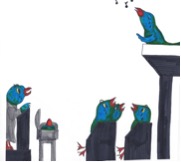Parakeets in the Choir
Chapter One
The Nightingale’s Song
The little pine coffin, simple in design, elegant in austerity, gaped with the tiny prisoner held in eternal abeyance within its wooden jaws. She was just a common song sparrow. No noticeable markings. No medallions lapped about her fragile neck. Her fame did not lie in public accomplishments celebrated by the press. There was no mass acclaim. She was not a celebrity.
She was just a common song sparrow who once brightened the neighborhood where she lived. She called to her many friends every morning with encouraging melodies that lifted the spirits of all who rose for the day’s toil ahead. While others cooked daybreak grits and fired up coffeepots, she sang. There was no coercion. She sang with spontaneous delight.
The effect of her lifeless body upon the gathered mourners was immense. The sparrow’s Spartan lifestyle reminded all that the essence of the gospel life is elegant simplicity, austere joy. She summoned spiritual strength from servanthood. She lived for others, not herself. Her life was her song. She sang tirelessly spinning out melodies directed at the homeliest of hearts, at the despondent souls that inhabited the byways and sultry nights of her working class neighborhood.
Now she lay in state, her little limbs stiff and cold, the melodies hushed. The mourners, hundreds of friends from the streets about her home, sat numbly wondering who would sing for them now. Who would coax them from their beds on dreary midweek days when the sun was clouded over? Who? Who would flutter from window box to window box smiling at them as they sipped morning coffee? Who? Already they missed her. Yes. Already they missed her.
 As the funeral progressed, the minister read his favorite texts promising a bright tomorrow. He reminded the sorrowful of the bliss of heaven and did his best to revive the song. He tried. But everyone knew she would warble no more. The songster was gone. The silence was too heavy for the sermon.
As the funeral progressed, the minister read his favorite texts promising a bright tomorrow. He reminded the sorrowful of the bliss of heaven and did his best to revive the song. He tried. But everyone knew she would warble no more. The songster was gone. The silence was too heavy for the sermon.
The minister heaved a cold sigh, closed the Bible and sat down on his stiff-backed pulpit chair covered in golden fabric. He sat down and dabbed at his misty eyes. He too wondered who would replace the song. Who?
The whole congregation was entombed in grief. No one moved. The Minister checked his watch and realized it was nearly time to depart. He had failed his people. Inspiration eluded him. Dismissal was all that remained. He dreaded to rise and dismiss. All was not properly settled.
Then, suddenly interrupting his limping reverie was a quiet melody so pure, so sincere, striding buoyantly with hope. It rose from the back of the sanctuary like angel’s breath from the recessed choir loft high and removed. Sweeter than taps, the heaven scented Aria fell over the congregation like mist on a cracked desert.
The effect was immediate. The desert began to bloom. Eyes red with grief brightened. Brows tight with death furrows softened.
The crowd immediately turned to stare up at the mysterious voice in the loft. What they saw was not an angel. They saw no apparitions or ghosts from paradise. No. What they saw was a humble nightingale whose own heart was broken over the loss of her friend in the casket.
She was not on the program. No one had officially recognized her. She did not mean to sing. But as she listened to the Scripture and reflected o n the sparrow’s life, singing seemed her natural contribution. She sang with her eyes closed spilling her heart upon the listeners and offering an inspired carol to God, who always appreciates genuine prayer.
n the sparrow’s life, singing seemed her natural contribution. She sang with her eyes closed spilling her heart upon the listeners and offering an inspired carol to God, who always appreciates genuine prayer.
The nightingale’s solo continued for a spellbinding period. The notes cascaded down upon parched attendants until without any warning or notice she stopped. She just stopped, wiped her eyes, blew her little nose with a delicate yellow hanky and then quietly flew off.
The minister, stunned over the unexpected performance, rose with renewed joy. He motioned for all to stand. “Go in peace,” he said, his face beaming. “Go in peace and remember the nightingale’s song,” he told them.
And they did.
“I was like one who comforts mourners” (Job 29:25).
David R. Denny Ph.D.









 I stood at the door of my 2B class wondering if I had made a mistake. After all, I had not seen my students in two weeks, and I did have the “rocket” stuck in my nose.
I stood at the door of my 2B class wondering if I had made a mistake. After all, I had not seen my students in two weeks, and I did have the “rocket” stuck in my nose. 

 The pews are weeping today. We all just learned of the tragic death of one taken far too early in life. Tiffany Smith, after a long battle with a brain tumor, succumbed this week and passed into the arms of the Savior. You may read her obituary at the Thornton Funeral Home site listed here:
The pews are weeping today. We all just learned of the tragic death of one taken far too early in life. Tiffany Smith, after a long battle with a brain tumor, succumbed this week and passed into the arms of the Savior. You may read her obituary at the Thornton Funeral Home site listed here:


